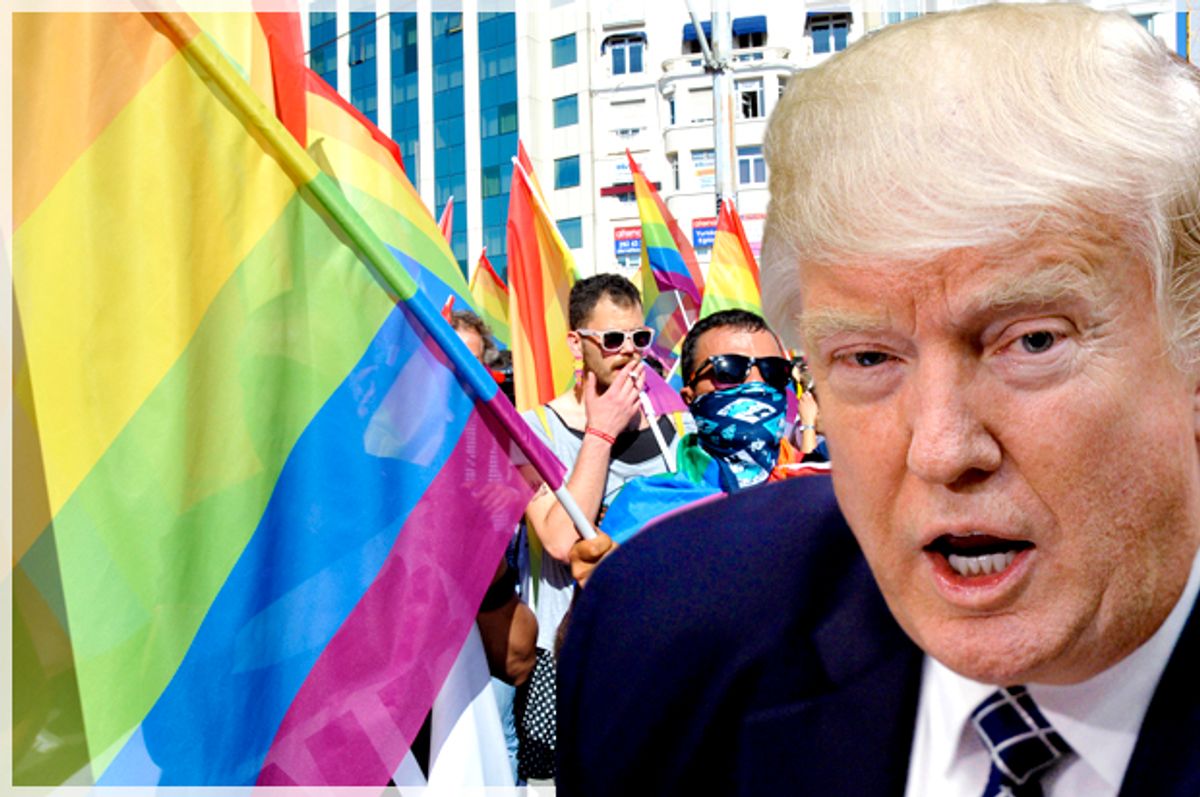Shortly after Donald Trump took office, he officially declared that his administration was “determined to protect the rights of all Americans, including the LGBTQ community,” following on his campaign promise to “do everything in my power to protect our LGBTQ citizens from the violence and oppression of a hateful foreign ideology.” (That would be a not-so-coded reference to Islam.) Despite such rhetorical gestures, Trump's administration can hardly be described as pro-LGBT.
On Wednesday, the Department of Labor announced a proposed change to federal rules that would make it easier for private employers who do business with the federal government to fire employees for their sexual orientation, gender identity or even their sexual activity outside of work. The proposed rule for the Office of Federal Contract Compliance Programs will clarify that government contractors — including for-profit corporations, schools and societies — may make employment decisions that align with their religious beliefs, which would including firing gay people, trans people and unmarried women who become pregnant. This new rule is designed to chip away at Barack Obama’s 2014 executive order barring contractors from discriminating on the basis of sexual orientation or gender identity. It could impact up to 420,000 employees working on federal contracts.
Seven permanent or acting agency heads have left the Labor Department in just the last year, and two different nominees to serve as labor secretary have withdrawn from Senate consideration. Yet one thing has remained consistent: The department has remained undeterred in its campaign to empower employees to discriminate against their own workers.
“Today’s proposed rule helps to ensure the civil rights of religious employers are protected,” said Acting Labor Secretary Patrick Pizzella in a prepared statement. “As people of faith with deeply held religious beliefs are making decisions on whether to participate in federal contracting, they deserve clear understanding of their obligations and protections under the law.”
Pizzella is yet another Trump administration fill-in, who took over after former Labor Secretary Alex Acosta resigned in disgrace over his handling of Jeffrey Epstein’s original Florida prosecution. (Acosta was the U.S. attorney in that case.)
In a call with reporters on Wednesday, a senior Labor Department official further argued that “Conscience and religious freedom rights have been given second-class treatment for too long,” adding that the new rule “fulfills the president’s promise to promote and protect our fundamental and inalienable rights of conscience and religious liberty, the first freedom protected in the Bill of Rights in the First Amendment itself.”
The DOL official claimed that the department is concerned that religious institutions like Christian colleges have been scared away from pursuing federal contracts by the Obama-era anti-discrimination rules.
“When we talked to stakeholders, we were informed that many religious organizations were not participating in the procurement process because of concerns that OFCCP would not fairly or correctly enforce the law related to the religious employer exemption,” the official told reporters.
This looks like a classic example of the “slippery slope” theory in action — the Trump administration appears to be legalizing discrimination, a little bit at a time, such that hardly anyone notices.
According to the notice published in the Federal Register, which will first be subject to a 30-day public comment period, the new rule refers to the Supreme Court’s decisions in the Hobby Lobby and Masterpiece Cakeshop cases for legitimacy. Those two cases allowed private companies to opt out of anti-discrimination laws that they claimed conflict with their religious beliefs — in one case baking a cake for a same-sex wedding and in another providing health insurance with birth control coverage for employees. Because neither pregnant women nor LGBT people are a protected class under the Constitution, the Supreme Court ruled that discrimination against them is lawful.
In October the high court will hear arguments about whether discrimination against LGBT employees violates Title VII of the 1964 Civil Rights Act. Under Attorney General William Barr, the Justice Department will reverse its Obama-era position and argue that LGBT people do not merit protection under that landmark law.
As The Hill reported, this is not the first time that LGBT rights in the workplace have been endangered during the current administration:
The Justice Department argued in court in 2017 that sexual discrimination protections in the workplace do not extend to sexual orientation and wrote in a brief to the Supreme Court in 2018 the protections also do not extend to transgender people.
If the Supreme Court rules that the Civil Rights Act does not bar discrimination based on sexuality or gender identity, the LGBT community has much more to fear than this most recent proposed rule change, which by design is relatively minor in scope.
"Once again, the Trump administration is shamefully working to license taxpayer-funded discrimination in the name of religion,” wrote the ACLU in a statement.
Trump’s latest move is only one part of a larger and more dangerous pattern. Another proposed rule announced by the administration this week seeks to exclude some Americans from the Affordable Care Act’s nondiscrimination protections, by allowing hospitals, health care providers and insurance companies that receive federal funding to refuse service to LGBT people and people living with HIV.
In May, Trump’s Department of Housing and Urban Development announced plans to propose a rule overturning an Obama-era guidance that required federally-funded homeless shelters to accept transgender people.
All this would seem to fly in the face of separation of church and state, a bedrock constitutional principle. The U.S. has no state religion — no matter what some Christian nationalists may believe — so, in theory, employers should not have the right to force their religious beliefs on anyone else, including their own workers. But the entire apparatus of the Trump administration appears committed to a stealth campaign to codify religious bigotry into law. So far, it appears to be working.



Shares